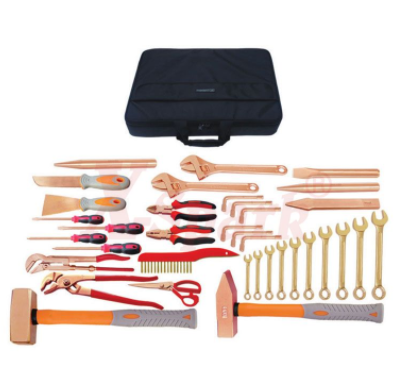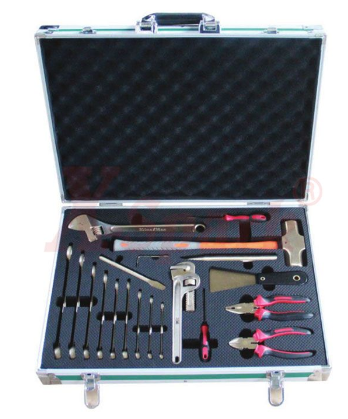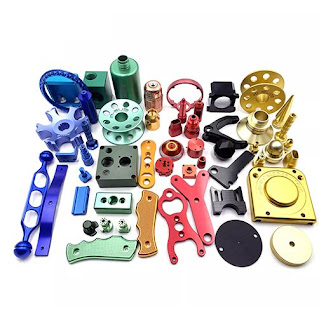Pros of Using Non-Sparking Tools in Acetylene Plants
Safe and health-friendly workplaces are a necessity in every country. In the United States of America, Occupational Safety and Health Administration (OSHA) directs employers to assure workplaces that are safe to work and ensures their safety and wellbeing. All industries are regulated by OSHA’s directives. The chemical industry is no exception from this. There are specific guidelines regarding the use of non-sparking tools in chemical equipment industries working with acetylene. Are you intrigued to know how these tools help acetylene plant owners to adhere to OSHA guidelines? What are the benefits offered by these tools? Read the post below.
Regulations and Adherence
According to OSHA’s Hand and Portable Powered Tools and Equipment Standard [29 Code of Federal Regulations (CFR) 1910.242(a)], employers are required to provide safe equipment and tools to their employees. It also recommends that employers maintain non-sparking tools in a safe and usable condition every time. The standard directs employers to avoid using non-sparking hand tools directly with acetylene, especially when moisture is present. As this may lead to the formation of explosive acetylides.
Although non-sparking tools are not recommended for direct use with chemicals like acetylene, still there are beneficial in many ways. Learn how by reading below.
A Brief Introduction to Non-sparking Tools
As the name suggests, these tools provide protection against fire and explosions in those environments, where flammable chemicals, fuels, materials, residues, or gasses may be present. Many times, these tools are also referred to as “spark-reduced”, “spark-proof”, and “spark-resistant”.
The spark-proof tools are made from various non-ferrous materials such as bronze, brass, Monel metal (copper-nickel alloy), copper-beryllium alloys (beryllium bronze), and copper-aluminum alloys (aluminum bronze). Today, the most used hand tools are created using steel alloys.
3 Reasons to Use Non-sparking Tools in an Acetylene Plant
The following are a few benefits of using spark-free tools in a chemical plant using acetylene equipment or acetylene gas.
1. Corrosion Resistance: Most non-sparking tools made from the fore mentioned metals exhibit strong corrosion resistance due to their material of construction. In addition to acetylene-laden environments, these tools are also ideal for applications where they may come in contact with alkali, acids, and various other types of chemicals.
2. Non-magnetic: Magnetism is usually associated with ferrous metals. As seen most non-sparking tools are made from non-magnetic metals. This helps reduce the chances of magnetic or electronic disturbances in the plants, where acetylene is used. Also, the non-sparking tools used in acetylene will not affect the settings of the instruments.
3. Durability: As discussed before, today, many non-sparking tools are made from copper alloys. It is often mentioned that low tensile strength steels are used for this construction. However, that doesn’t mean these tools are softer. As with any regular tools, most of these non-sparking tools are durable and strong enough to withstand the regular abuse at chemical plants.
Due to the above-mentioned reasons, non-sparking tools are considered safe for users in volatile environments. Also, it is important to maintain these tools in good working condition. The next section describes some tips to do so.
Safety Tips to Keep in Minds While Using the Non-Sparking Tools
Given below are safety tips for using non-sparking tools properly and keeping them in mint condition:
1. Use the right-sized tool for any task in the acetylene plant. This will help avoid the tool from slipping from hand, and chances of sparking.
2. Never store tools where they could be exposed to moist acetylene.
3. Maintaining cleanliness. These tools must be kept clear of any unwanted particle deposits and dust. A lot of times, residues get settled on the ends of the non-sparking tools; these deposits make the tools even more prone to producing sparks, triggering fires or explosions as a result.
4. Overall maintenance. Non-sparking tools are fragile equipment because of their exceptionally high levels of softness in comparison with that of the steel hand tools. Thus it is important to use these tools lightly and maintain them from time to time.
5. Cross ventilation. Dust is almost always present in places where the air is stagnant and does not get a passage to go in and out from. In the presence of dust, explosions in vulnerable environments are commonplace.
6. Crucial checks. Monitoring the environment proactively from time to time is another thing that can ensure that a potentially hazardous situation hasn’t developed.
In addition to using good quality non-sparking tools, it is important to source acetylene plants from a reliable supplier. Hebei Botou Safety Tools Group is one of the trusted manufacturers and distributors of acetylene plants.
Related Products:
does brass spark
brass hand tools
oil dipper
triangular scraper
non sparking shovel
copper sledge hammer
adjustable box wrench
injection knife
100pcs tool set
wrench manufacturer
edging spade
brass pliers
spark plug cleaning brush
moon scraper,half moon scraper
bent snipe nose pliers
valve wrench tool



评论
发表评论